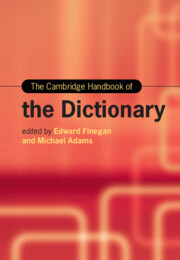Description
The Cambridge Handbook of the Dictionary
Cambridge Handbooks in Language and Linguistics Series
Coordinators: Finegan Edward, Adams Michael
Language: English
Subject for The Cambridge Handbook of the Dictionary:
Publication date: 07-2024
826 p. · Hardback
826 p. · Hardback
Description
/li>Contents
/li>Biography
/li>
There is no such thing as 'the dictionary'. Rather, there are innumerable kinds of dictionaries that respond to their authors' aspirations and their users' needs. In each case, the negotiation among a dictionary's material, its authors, and its readers tells a rich cultural story. Bringing together cutting-edge research from an international team of experts, this interdisciplinary Handbook provides an all-encompassing account of dictionaries in context. Organized into five thematic parts, its chapters cover a multitude of topics such as types of dictionaries, the place of dictionaries in intellectual, cultural and book history, and dictionaries as material objects, as well as their visual design. It also explores the role of dictionaries in a select group of special fields where words especially matter (for instance, law), the business contexts in which dictionaries are made, and finally the future of dictionaries. There is no fuller or more compelling overview of dictionaries available today.
Acknowledgments; Introduction Michael Adams and Edward Finegan; Part I. Types of Dictionaries: 1. Dictionary typologies Michael Adams; 2. Historical and other specialized dictionaries Ammon Shea; 3. Thesauri Kate Wild; 4. Commercial dictionaries Orin Hargraves; 5. Bilingual dictionaries Carla Marello; 6. Learner's dictionaries Shigeru Yamada and Hai Xu; 7. Children's dictionaries Susan Rennie; 8. Dictionaries of quotations and dictionaries of proverbs Elizabeth Knowles; Part II. Dictionary as Book: 9. Dictionary typography Michael Adams; 10. Illustrations in dictionaries Michael Hancher; 11. Page and book design in dictionaries Wendalyn Nichols; 12. Dictionaries in book history John Considine; 13. Dictionaries as material objects Lindsay Rose Russell; Part III. Dictionaries and Ideology: 14. Dictionaries, language ideologies, and language attitudes David West Brown; 15. Dictionaries and cultural politics Lindsay Rose Russell; 16. Usage in dictionaries and dictionaries of usage Don Chapman; 17. Dictionaries and language contact Jason F. Siegel; 18. Dictionaries in religious history and biblical interpretation William A. Ross; 19. Attitudes toward 'the dictionary; Edward Finegan; Part IV. Dictionaries and Domains of Use: 20. Dictionary audiences Katherine Connor Martin; 21. Dictionaries and intellectual history John Considine; 22. Dictionaries and social history Carol Percy; 23. Linguistics and philology in dictionaries Anatoly Liberman; 24. Dictionaries as literary artifacts Ilan Stavans; 25. Dictionaries and editors Jonathon Owen; 26. Lexicography and the law Bryan A. Garner; Part V. The Business of Dictionaries: 27. Organizing dictionary projects Cathal Convery; 28. Editing dictionaries Joseph P. Pickett; 29. Publishing the dictionary: the business side of the business John Morse; 30. Legal and ethical issues in dictionary-making Michael Adams; Part VI. The future of Dictionaries: 31. The future of dictionaries Gilles-Maurice de Schryver.
Edward Finegan is Professor Emeritus of Linguistics and Law at the University of Southern California. He served as President of the Dictionary Society of North America and of the International Association of Forensic Linguists. He has published widely on dictionaries and attitudes toward dictionaries.
Michael Adams is Provost Professor in the Department of English at Indiana University at Bloomington. He has contributed to the Middle English Dictionary, the American Heritage Dictionaries, and the Barnhart Dictionary Companion and served as editor of the journals Dictionaries and American Speech. He is a Fellow of the Dictionary Society of North America.
Michael Adams is Provost Professor in the Department of English at Indiana University at Bloomington. He has contributed to the Middle English Dictionary, the American Heritage Dictionaries, and the Barnhart Dictionary Companion and served as editor of the journals Dictionaries and American Speech. He is a Fellow of the Dictionary Society of North America.
© 2024 LAVOISIER S.A.S.




